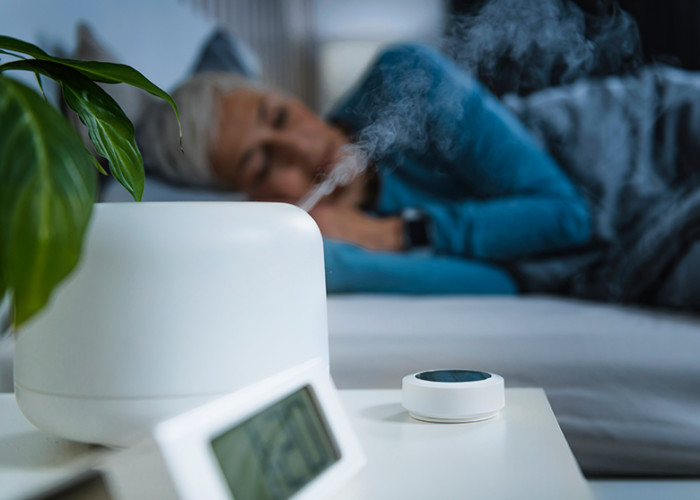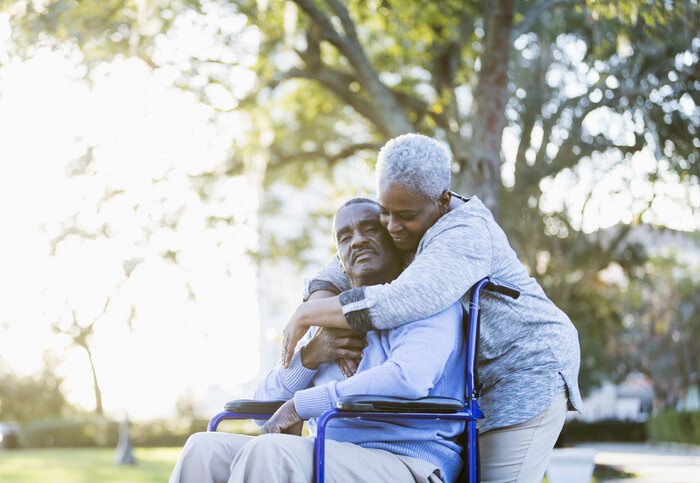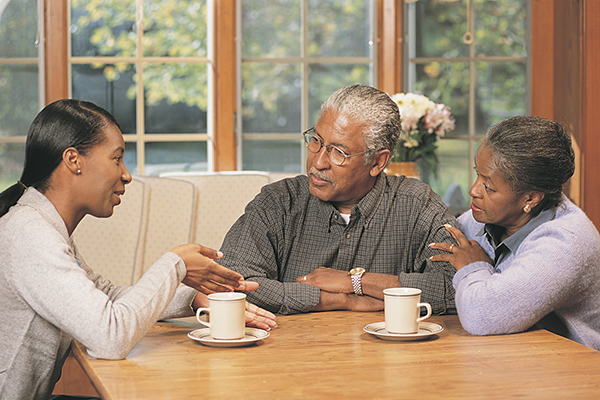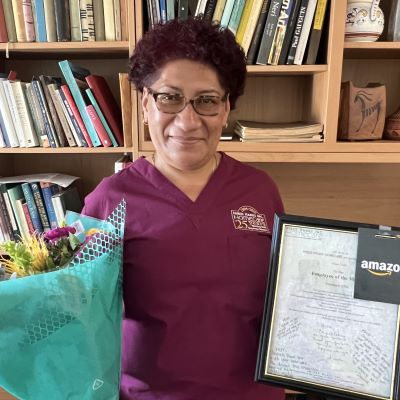Chronic Conditions
Humidifiers for COPD: Helpful or Harmful?
Learn from our home care experts when and if humidifiers for COPD should be used.
For seniors and anyone else with a lung condition like COPD, maintaining the best possible air quality within the home is vitally important. But are humidifiers for COPD the right solution? The answer isn’t a simple yes or no. If the air is too dry, for example, it can cause or exacerbate health problems including:
Chapped, dry, or itchy skin
Nose bleeds
Dry eyes
Sore throat
Aggravated allergy, asthma, and cold/flu symptoms like congestion
And more
However, air that is too humid can cause mold and mildew to grow, which can lead to a host of health problems along with potential damage to the home.
Humidifiers, when used properly, can help maintain the ideal level of moisture in the air (between 30 and 50%), and in particular for those … Read More »
Understanding Parkinson’s Fatigue: It Feels Like “Walking Through Molasses”
Parkinson’s fatigue affects a person cognitively, physically, and emotionally.
Parkinson’s fatigue affects as many as one in two people with the disease, but until recently, we haven’t fully understood just how debilitating this condition actually is. A study is providing us with the insight we need to comprehend the impact of Parkinson’s fatigue, and what we can do to help someone experiencing it. Led by Duke University’s Sneha Mantri, MD, the goal of the research was to gain firsthand patient insights to know how to better address this challenging condition.
Three distinct areas of fatigue were investigated in the study: physical, emotional, and cognitive. Participants were asked to describe their level of fatigue, and the terms they used were quite revealing, including feeling unmotivated, overwhelmed, isolated, lacking energy, and as if they were “walking through molasses.”
Parkinson’s fatigue … Read More »
5 Ways to Calm Agitation in Alzheimer’s
Agitation in Alzheimer’s is common but can be eased with these tips.
Agitation in Alzheimer’s is one of the more difficult effects a senior may experience, and it can be incredibly hard for family members to manage. The key is in taking steps to handle agitation before it’s felt and expressed by the senior, which involves keeping track of what has brought about these feelings in the past, and creating a home environment in which those triggers are removed or minimized. These strategies can help:
Designate an area of retreat. When life begins to get stressful, having a specially created area for a senior loved one to go to de-stress can work wonders in restoring calm. This could be a separate room, or merely a comfortable corner with several soothing activities easily available, quiet music, a calming scent to … Read More »
Warning: These Common Medications May Increase Dementia Risk
Certain medications may now be linked to an increased dementia risk.
They are currently recognized to cause various short-term side-effects, for example, memory issues and confusion, but new research links some of the stronger anticholinergic drugs (like those prescribed for Parkinson’s disease, epilepsy, depression, and overactive bladder) to a markedly higher dementia risk.
The research involved two groups of seniors: 59,000 patients with dementia, and 225,000 without. Approximately 57% of those with dementia, and 51% without, were supplied a minimum of one (and up to six) potent anticholinergic medications. Considering other established dementia risk factors, the outcomes were an astounding 50% increased risk of dementia in individuals who were taking strong anticholinergics daily for three or more years, with the highest risk to people who received a dementia diagnosis before age 80.
It is critical to note that … Read More »
How to Empower Seniors to Take Control for Better Chronic Health Care
Seniors know best what they’re dealing with; empower them to take control of their chronic health care needs.
When it comes to chronic health care, seniors are the experts, hands down, with up to three out of four seniors affected by a number of conditions that are ongoing, necessitate long-term medical treatment, and place restrictions on activities. With the never-ending barrage of bloodwork as well as other tests, physicians’ appointments and procedures, and medications, managing chronic diseases usually takes both a physical and emotional toll, and may quickly become daunting.
Dr. Mary Tinetti, chief of geriatrics and internist at Yale School of Medicine, said, “Once you get three, four, or five and six diseases, several things happen: Number one, almost guaranteed, trying to get one of these diseases under control is going to make one of the other … Read More »
End-of-Life Care Tip: Participating in Tough Conversations
When providing end-of-life care, one of the best gifts you can offer is a listening ear.
Sharing what’s on our hearts with those we love is never more important than when someone is nearing the end of life. There are often unspoken sentiments and unresolved issues that, once verbalized, can bring peace and a deeper connection with our loved ones in their final days.
As Dr. Jessica Zitter, physician in critical and palliative care medicine at Highland Hospital in Oakland, CA explains, “Those are opportunities for people to take stock and say, ‘I want to be more intentional about how I want to relate to people in my life.’ Death should really be seen as the last opportunity that you have to make amends and clean things up before you’re in the next world, wherever that may be.”
Read More »
How to Help Someone with Parkinson’s from a Distance
If you’re wondering how to help someone with Parkinson’s disease when you live out of the area, we have four suggestions for you.
The days when extended families lived together on neighboring plots of land are, unfortunately, a thing of the past in many cases. With loved ones spread apart, it’s not always possible to provide the caring, hands-on care and support that older family members often need, especially when a chronic health condition – like Parkinson’s disease – creates additional concerns.
Yet even from a distance, there are still plenty of ways to assist. The Michael J. Fox Foundation offers these tips on how to help someone with Parkinson’s from afar:
Get organized. Take and keep detailed notes about medications being taken, treatments, emergency contacts, and other aspects of the person’s care needs. A digital version of this … Read More »
How to Find Joy Despite Living with Pain or Chronic Illness
Even while living with pain or chronic illness, it is possible to live a full and joyful life.
Have you ever woken up and said, “It’s definitely going to be one of those days!” Maybe your alarm didn’t go off, the hot water heater decided to stop working, and the dog chewed up one of your favorite shoes overnight. Now consider if each day were “one of those days!” For someone living with pain or chronic illness (and that is the majority of the older adult population), routine struggles and challenges may be a given.
However, there are several steps that the elderly can take to discover and maintain a life of joy, even in the face of chronic illness. For instance:
Follow passions. Discovering purpose and meaning in every day is essential – and achievable. Many older adults … Read More »
Caring for Someone with Dementia? Here’s What You Need to Know.
Caring for someone with dementia is easier with help from our experts in elderly care in Pleasanton and nearby areas.
At times, the best lessons in life come through going through them firsthand; yet the wisdom we are able to glean from those who have walked an identical path before us is priceless. If you’re caring for someone with dementia and feeling a bit stressed in this uncharted territory, the guidelines below will help:
How to Respond if You’re Noticing Early Warning Signs of Alzheimer’s
Learn how to best handle addressing early warning signs of Alzheimer’s from our experts in home care assistance in Walnut Creek & the nearby areas.
Our natural instinct when we are picking up on the early warning signs of Alzheimer’s or another type of cognitive decline in ourselves or someone we love is to look the other way, denying that there is a problem. However, the Alzheimer’s Association advises that it’s vitally important to face the issue head-on as quickly as possible, since early diagnosis and intervention allow for the most effective treatment plan to be put into place.















